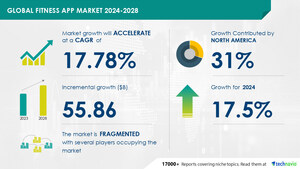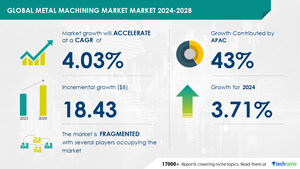NEW YORK, July 9, 2024 /PRNewswire/ -- The global department stores market in Germany is estimated to grow by USD 2.05 billion from 2024 to 2028, at a CAGR of almost 4.36%, according to Technavio. Rapid urbanization and rising consumer spending are driving market growth, with a trend towards increased demand for private-label brands. However, a slowdown in sales in retail stores poses a challenge. Key market players include Aldi Group, C&A Mode GmbH, GALERIA Karstadt Kaufhof GmbH, Harrods Ltd., and Marks and Spencer Group plc.
Get a detailed analysis on regions, market segments, customer landscape, and companies - Click for the snapshot of this report
Forecast period |
2024-2028 |
Base Year |
2023 |
Historic Data |
2018 - 2022 |
Segment Covered |
Product (Consumer electronics and electricals, Home furniture and furnishings, Cosmetic and fragrance, and Others), Type (Up-scale department stores, Mid-range department stores, and Discount stores), and Geography (Europe) |
Region Covered |
Germany |
Key companies profiled |
Aldi Group, ausberlin, C and A Mode GmbH and Co KG, Claims Conference, East Side Mall, elbstolz, Engelhorn, Fast Retailing Co. Ltd., Fenwick, GALERIA Karstadt Kaufhof GmbH, Harrods Ltd., Kaufhaus Ahrens GmbH and Co. KG, Ludwig Beck am Rathauseck Txtlhs FldmrAG, Manufactum GmbH, Marks and Spencer Group plc, Modehaus Garhammer GmbH, Muller Handels GmbH and Co. KG, SCHMIDT ARKADEN GmbH and Co. KG, The KaDeWe Group GmbH, and Werbeverein Schadow Arkaden eV |
Key Market Trends Fueling Growth
In 2023, the German department store market experienced growth in private-label grocery and apparel products. A select few retailers dominate the German retail sector, yet they continue to expand their private-label product lines. Popular private-label grocery items, including soft drinks, frozen and refrigerated foods, alcohol, snacks, confectionery, meat, dairy, and sausages, have seen a rise in demand. Private-label brands offer these products at competitive prices, fueling their popularity among retailers. Changing consumer expectations call for premium products at affordable prices, leading to the emergence of private-label brands. The increasing demand for private-label brands is propelling the expansion of discount department stores and supermarkets in Germany. Thus, the growing preference for private-label brands is anticipated to present growth prospects for discount department stores, contributing to market expansion during the forecast period.
Department stores in Germany cater to various consumer needs, offering a wide range of products from Apparel and Accessories, FMCG, Hardline, and Softline. Brands, both branded and unbranded, dominate the market, with an increasing trend towards private-label brands. Fashion trends and lifestyle changes influence consumer preferences. Retail landscape is evolving with AI and biometrics enhancing shopping experiences. Education levels and standard of living impact consumer behavior. Festive seasons boost sales in Men's wear, Women's wear, and Accessories. Household furnishing, including Designer furniture, is a growing sector. Retailers face operational costs pressure, leading to innovation in areas like Online retailing and Brick-and-mortar stores. Consumer packaged goods see shifts in Packaging formats, with Premium and Innovative packaging gaining popularity. Sustainable packaging is a key trend. The retail organization adapts to consumer convenience, with Fashion, Hardline, and Softline offerings catering to diverse demographics. Lifestyle changes influence product ranges. AI and biometrics are transforming retailing, while shopping malls remain popular destinations. Festive seasons bring unique shopping experiences.
Discover 360° analysis of this market. For complete information, schedule your consultation- Book Here!
Market Challenges
- The department store market in Germany has faced a significant decline in sales over the past few years. Traditional retail stores selling items such as clothing, electronics, bags, toys, and sports goods have experienced a downturn due to increasing competition from shopping malls and e-commerce websites. In March 2023, retail sales in Germany decreased by 6.5% compared to the previous year. Moreover, retail sales volumes dropped 8.8% in June 2022. Consequently, some department stores in the country have closed or filed for bankruptcy. Online sales for these stores have shown substantial growth in the last three years, indicating a shift in consumer behavior. The department stores market in Germany is expected to experience slower growth during the forecast period due to these trends.
- The German Department Stores Market faces several challenges. Education levels and standard of living influence consumer purchasing power. Shoppers prefer shopping malls for convenience, but brick-and-mortar retailers face high operational costs. Private-label brands and consumer packaged goods dominate, with varying packaging formats from premium to sustainable. Innovative and automated payments enhance the shopping experience. Online retailing and e-commerce are growing, but festive seasons and lifestyle preferences keep drawing shoppers to department stores. Retailers must adapt to consumer preferences for men's wear, women's wear, accessories, household furnishings, hardline and softline goods. Transportation and retail organization are crucial for effective retailing. Management must navigate control structures, discounted rates, and AI and biometrics to stay competitive. Clothing stores and food courts add to the department store experience.
For more insights on driver and challenges - Download a Sample Report
Segment Overview
This department stores market in Germany report extensively covers market segmentation by
- Product
- 1.1 Consumer electronics and electricals
- 1.2 Home furniture and furnishings
- 1.3 Cosmetic and fragrance
- 1.4 Others
- Type
- 2.1 Up-scale department stores
- 2.2 Mid-range department stores
- 2.3 Discount stores
- Geography
- 3.1 Europe
1.1 Consumer electronics and electricals- In the German department store market, consumer electronics and electricals are popular product categories with significant demand. Products such as smartphones, tablets, televisions, air conditioners, refrigerators, and kitchen appliances are frequently purchased. The interest in wearable electronics, including fashion electronics and activity trackers, is growing. However, the rise of consumer electronic sales on e-commerce platforms has negatively affected department store sales. Retailers attempt to counteract this trend by matching prices, reducing online-offline price discrepancies, and launching online stores. However, department stores have seen a substantial decline in revenue from consumer electronics and electricals sales. Additionally, supermarkets and specialty stores have gained market share, with Media Markt Saturn Retail Group being a major player. This shift in consumer behavior has led to moderate growth expectations for the department store segment in the forecast period.
For more information on market segmentation with geographical analysis including forecast (2024-2028) and historic data (2018 - 2022) - Download a Sample Report
Research Analysis
The Department Stores Market in Germany is a significant sector of the retail industry, offering a wide range of goods under one roof. These stores typically include sections for Clothing Stores, Food Courts, and Hardline and Softline products. Transportation is essential for the smooth functioning of department stores, ensuring the timely delivery of goods from suppliers. Automated Payments have become increasingly popular, providing a convenient shopping experience for shoppers. Retail Sales in department stores have been on the rise, driven by the purchasing power of consumers and the appeal of one-stop shopping. Retailers manage these stores through a control structure, overseeing the sale of Apparel and Accessories, FMCG, and Household Furnishing, among other goods. Discounted rates and license agreements are common strategies used to attract shoppers. Men's wear, Women's wear, and Accessories are popular categories, with Hardline and softline products catering to various consumer needs. E-Commerce is also a growing trend, with many department stores offering online shopping options. Retailing is a dynamic industry, continually adapting to changing consumer preferences and market trends.
Market Research Overview
The Department Stores Market in Germany is a significant sector of the retail industry, offering a wide range of goods under one roof. This market includes Transportation services, Clothing Stores, Food Courts, and more. Automated Payments have become increasingly popular for seamless transactions. E-Commerce is also a growing trend, with retailers adapting to online retailing. Retail Sales continue to rise, driven by the purchasing power of shoppers. Department stores offer a variety of goods, from Apparel and Accessories to FMCG, Hardline, and Softline. Brands, both branded and unbranded, are a key focus, as are Designer furniture and Fashion trends. The retail landscape is constantly evolving, influenced by lifestyle changes, AI, and biometrics. Management of department stores involves a complex control structure, with operational costs a significant consideration. Convenience and Retail organization are crucial factors in attracting shoppers. The market caters to various consumer segments, with Education levels and Standard of living playing a role in purchasing power. Shopping malls and Private-label brands are also part of the department store ecosystem. Consumer packaged goods come in various Packaging formats, with Premium and Innovative packaging gaining popularity. Sustainable packaging is a growing trend, reflecting consumers' increasing focus on the environment. Festive seasons and Lifestyle events drive sales, with Men's wear, Women's wear, and Accessories being popular categories. Brick-and-mortar retailers continue to compete with online retailers, offering Discounted rates and a more tactile shopping experience. AI and biometrics are being integrated into retail operations to enhance the shopping experience.
Table of Contents:
1 Executive Summary
2 Market Landscape
3 Market Sizing
4 Historic Market Size
5 Five Forces Analysis
6 Market Segmentation
- Product
- Consumer Electronics And Electricals
- Home Furniture And Furnishings
- Cosmetic And Fragrance
- Others
- Type
- Up-scale Department Stores
- Mid-range Department Stores
- Discount Stores
- Geography
- Europe
7 Customer Landscape
8 Geographic Landscape
9 Drivers, Challenges, and Trends
10 Company Landscape
11 Company Analysis
12 Appendix
About Technavio
Technavio is a leading global technology research and advisory company. Their research and analysis focuses on emerging market trends and provides actionable insights to help businesses identify market opportunities and develop effective strategies to optimize their market positions.
With over 500 specialized analysts, Technavio's report library consists of more than 17,000 reports and counting, covering 800 technologies, spanning across 50 countries. Their client base consists of enterprises of all sizes, including more than 100 Fortune 500 companies. This growing client base relies on Technavio's comprehensive coverage, extensive research, and actionable market insights to identify opportunities in existing and potential markets and assess their competitive positions within changing market scenarios.
Contacts
Technavio Research
Jesse Maida
Media & Marketing Executive
US: +1 844 364 1100
UK: +44 203 893 3200
Email: [email protected]
Website: www.technavio.com/
SOURCE Technavio

WANT YOUR COMPANY'S NEWS FEATURED ON PRNEWSWIRE.COM?
Newsrooms &
Influencers
Digital Media
Outlets
Journalists
Opted In




Share this article